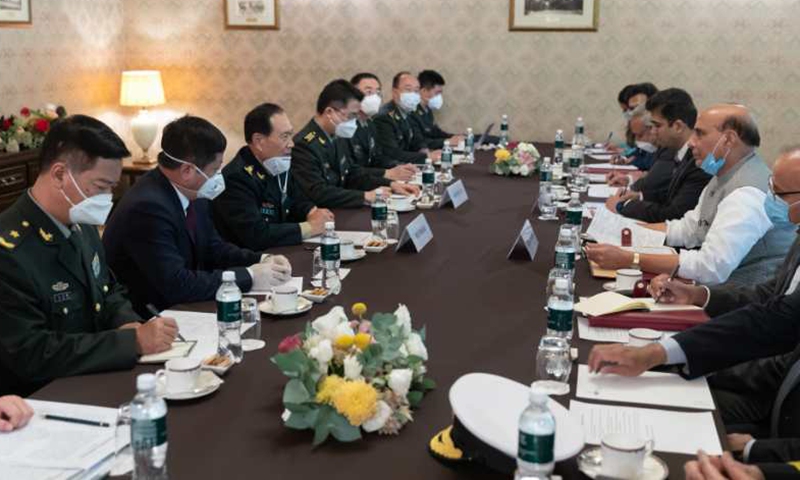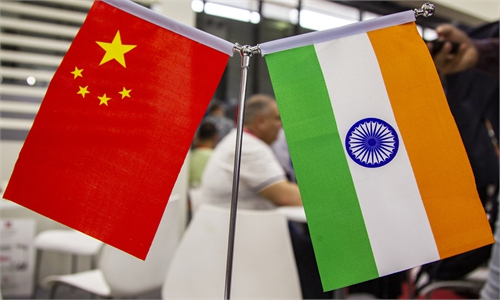
Photo:Xinhua
The defense ministers of China and India reportedly met on the sidelines of the Shanghai Cooperation Organization (SCO) meeting in Moscow, Russia on Friday. Experts said the meeting serves as an opportunity for the two sides to exchange ideas on the current border tensions and avoid more fierce confrontations due to miscalculations.
Indian media reported that Chinese Defense Minister Wei Fenghe "has sought" a meeting with his Indian counterpart Rajnath Singh in Moscow and the embassies of the two sides are working on this.
China may not have initiated the meeting but China would not refuse efforts to defuse the current tensions via negotiation, experts said.
The meeting between the defense ministers is the first and highest level of face-to-face talks after recent border clashes. It would help the two countries enhance communication on defense, control the situation, and avoid the recent stand-off at the south Pangong Tso Lake escalating into wider clashes, Qian Feng, director of the research department at the National Strategy Institute of Tsinghua University in Beijing, told the Global Times.
Chinese State Councilor and Foreign Minister Wang Yi had phone calls with Indian Minister of External Affairs Subrahmanyam Jaishankar and India's National Security Adviser Ajit Doval in July after the skirmish in Galwan Valley, which helped stabilize the situation.
But Qian noted that it is unrealistic to settle all problems in one meeting, and this meeting will promote departments related to border areas to take further steps to ease the current stand-off.
Qian said that Indian media reports on the meeting are full of false information, including that China frequently "required" the meeting, or that India refused a meeting with China. The disinformation may have been revealed by some Indian officials on purpose to portray the government as "tough" in safeguarding its sovereignty to its people.
After the meeting, Indian media may also come up with more vivid reports on "China makes compromises under Indian pressure," or "India barely agrees to meet for regional peace," Qian said.
News on the possible meeting of defense ministers came amid border stand-off and India's increasingly aggressive military activities along the border areas. The Indian Army has reportedly changed its posture from border management to "securing order" on the 1,597 kilometers of Line of Actual Control (LAC) and deployed additional specialized forces.
It is clear that India is the one that is making provocations and should take responsibility for the increased tensions. India is attempting to pressure China - using aggressive military deployment along the border - in the hope of gaining an upper hand in the negotiations, but also sending soft signals to the international community, trying to downplay its aggressive actions, Qian told the Global Times.
During an online event organized by the Observer Research Foundation (ORF) to mark the release of his book, "The India Way: Strategies for an Uncertain World," on Thursday, Jaishankar said that the solution to the current India-China crisis "has to be found in the domain of diplomacy," and that he would meet with Chinese Foreign Minister Wang Yi in Moscow on September 10.
Jaishankar also criticized the US for disrupting the world in order to get better terms from the world.
During a visit to the Ladakh region, where the two militaries have been squaring off, India's army chief General Manoj Mukund Naravane also said on Friday he was confident that the ongoing border stand-off with China in the western Himalayas could be resolved through talks, Reuters reported on Friday.
Qian said it is possible that Wang may meet with his Indian counterpart in Moscow. Jaishankar's remarks show that avoiding the escalation of current tensions aligns with India's national interest.
Russia, responsible for chairing this year's SCO meetings and the only power that keeps good ties with both China and India, may play a key role in de-escalation by offering a platform for China and India to negotiate the dispute. Under the mechanism of the SCO, member states also have various channels to solve problems and maintain regional peace, Qian told the Global Times.
Since China and India agreed to settle their disputes through the current bilateral coordination system, Russia's friendly gesture could further facilitate the talks between China and India, Qian said, noting that India's recent moves along the border areas have not helped defuse tensions.


